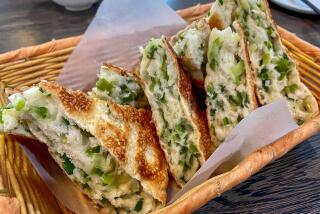COLUMN ONE : China Tries to Halt the Gravy Train : Fearing a backlash, Beijing tells party officials to stop feasting at public expense. Gaudy food palaces are quieter now, but many suspect the gluttons are just being more discreet.
- Share via
YANAN, China — The evening program of revolutionary songs in this historic Communist stronghold was interrupted by a public announcement.
“The devil’s wind has come to our province,” a voice boomed over the town’s central loudspeakers. “Strive to eliminate corruption. Obey the spirit of the central government. Don’t dine out on official money.”
What better place than Yanan, on the rugged loess plateau of Shaanxi province in north-central China, to announce the latest government campaign against lavish feasting and entertaining by party officials at public expense? Yanan, about 420 miles southwest of Beijing, is the very symbol of Communist austerity dating to the famous Long March, when Mao Tse-tung and the surviving nucleus of the Communist Party took refuge here in caves and subsisted on peasant gruel.
But all over China these days, the party newspapers are full of accounts of banquet-crazed officials caught with their chopsticks on the public plate.
Examples have been made of the Anhui province education commissioner who hosted 163 banquets in 14 months; of the rural county office that spent $4,000 on a sumptuous meal for 12 people; of the Shaanxi policemen who made the mistake of hiring dancing girls in a karaoke restaurant when it was being inspected by the party discipline committee.
Wining and dining had become virtually synonymous with the period of economic liberalization under senior leader Deng Xiaoping. But in the uncertainty of the succession struggle that is expected to follow the ailing Deng’s death, the government has been extremely sensitive to criticism of corruption.
What the Communist Party leadership has not explained, however, is how it intends to deinstitutionalize the practice of pretentious feasting at public expense.
At Hong Kong Food City in Beijing, a five-story restaurant that seats 700, a manager said the biggest spenders are not business people but minor officials in from the provinces on a visit to the capital. A banquet at the mammoth eatery, including such delicacies as fresh abalone with black mushrooms and bird’s nest soup with coconut juice, can cost as much as $60 a person, not including drinks.
Blazing neon-lighted food palaces featuring exotic specialties and imported brandies line the roadsides of most major cities--gaudy Vegas-style strips dedicated to putting on the dog. On any given night, many of the customers are Communist officials entertaining each other and letting the public foot the bill.
A recent article in Guangzhou’s Yangcheng Evening Post newspaper said that every year more than $12 billion in public money is spent on banquets in China.
Official banqueting is certainly not new.
In fact, the Communist Party has sometimes used its skill at hosting banquets to great advantage. In his memoirs of the 1972 discussions that led to the United States’ diplomatic recognition of the People’s Republic of China, former Secretary of State Henry A. Kissinger wrote glowingly of the rich banquet fare washed down with powerful Chinese mao tai liquor.
“After a meal of Peking duck, I’ll sign anything,” Kissinger said, according to a RAND Corp. report on the negotiations.
There is a long history of campaigns against public officials wasting time and national resources on food and drink when they should have been tending to business.
A famous 12th-Century poem by Lin Sheng described how Gaozong, emperor of the Southern Song Dynasty, feasted away his kingdom, enjoying delicacies prepared by cooks on the banks of West Lake in ancient Hangzhou while neglecting the needs of his people.
“The court sought the merry life with no regard for state affairs,” the poet wrote.
But the Communists emerged from the hardscrabble hills and ravines of Yanan to come to power 46 years ago as the party of self-denial and public service. Now some in the party fear that the image has been badly damaged by this binge of gluttony and high living.
Making an Impression
Public officials in China have little chance to flaunt their power with big houses and fancy cars. The private home or vacation cottage is still a luxury out of reach except for the highest-ranking Communist leaders. Imported cars do fill the parking lots in front of hotels and restaurants, but they belong to government ministries and work units.
Thus, for many officials, the banquet remains the most dramatic way to demonstrate their clout and impress their friends.
But it often impresses the common people in a different way. A Beijing journalist recalled an incident outside the Fat Beef Restaurant, a fabulously expensive banquet hall near Tian An Men Square, involving a bicycle rickshaw driver and his son.
The son watched as security guards shooed away the rickshaw driver from the restaurant’s parking lot. Enraged, the son charged the official black cars parked there and began to break radio antennas until he was restrained.
Similar attitudes are also reflected in the non-official press.
A crude cartoon in the Beijing Popular Tribune magazine recently depicted a waitress stuffing wads of money and drink down the throat of a government functionary while a businessman waited in the shadows for the official stamp on a contract. A bureaucrat in Urumqi, capital of far western Xinjiang region, was accused of reducing a required business deposit from $36,000 to $6,000 after a businessman treated him to a $150 meal.
In fact, the government crackdown on banqueting is not just aimed at the official who wastes public money but also at the official who trades government favors for a good meal.
As many foreign business people working in China have come to learn, the way to a contract usually passes through an expensive restaurant or karaoke bar.
“Ballrooms, nightclubs, deluxe hotels, inns and deluxe shopping malls are being built,” complained Liu Deyuan, a member of the Chinese People’s Political Consultative Conference. “There are neon lights, fine wine and live music. . . .
“Banquets and presents have become the necessary means for getting deals done, establishing relationships and doing business.”
Even here in Yanan, the cradle of Chinese socialism, most restaurant owners say they depend on the business of party cadres to make a profit.
Who else but visiting public officials, asked the owner of the Jian Qiao Restaurant, can afford the $70 special meal that includes courses of snake soup, cow stomach, pigeon, jellyfish and ox penis? Such ostentatious consumption has added to public distrust of leaders accused of being more interested in serving themselves than serving the people.
What Would Mao Say?
It’s amusing to ponder what Chairman Mao’s response would have been if he knew there would someday be a restaurant in rugged Yanan serving jellyfish. In fact, such restaurants, even those in the remotest regions, form a cottage industry based on official business.
During the meeting of the National People’s Congress this year when the anti-banqueting campaign was mapped out, Wang Lequan, a delegate from Xinjiang region, put his finger on the potentially volatile problem in a radio interview.
“In Xinjiang,” he said, “there are several million peasants and herdsmen whose families lead a very hard life. . . . Nearly half of state-owned enterprises are encountering economic difficulties, and the families of some staff members and workers have a per capita income of less than 60 yuan [$7.30] a month.
“In contrast, some people use a large amount of public funds to indulge themselves at banquets at a price of more than 1,000 yuan or even several thousand yuan each, thereby producing a very bad influence on the masses.”
According to reports in the Chinese media, the anti-banquet campaign, which began in March, has already had some results, at least at the highest-profile restaurants. But many feel that the official banqueting business hasn’t so much diminished as it has moved to more discreet locales until the heat is off.
Reporters from the Beijing-based Guangming Daily fanned out across China to interview restaurant and nightclub owners.
In Xian, the ancient Chinese capital in Shaanxi province, the reporters interviewed the owners of 73 ballrooms on a busy strip of Eastern Avenue. The owners said business has been “very poor” since the provincial government accelerated its crackdown this month.
If the campaign continues, it is clear that some of the ballrooms on Eastern Avenue and similar entertainment strips across China will be in danger of closing.
In Beijing, there are four restaurants so famous for their expensive banqueting that they are popularly nicknamed “the three knives and the hatchet” because customers who go there come away nicked and bleeding money.
The most modest is the Shan Fu restaurant on a hill overlooking one of the ancient imperial lakes in northern Beijing. Two small banquets, including one attended by uniformed military officers, were in full swing on a recent afternoon.
The outside parking lot was jammed with official vehicles, including one from the Beijing Police Department. Business people flowed in and out. It was another typical afternoon mixing food, business and government affairs.
Still, the manager on duty at the restaurant, which features seafood “hot pot” and Korean barbecue, and Courvoisier XO at $10 a glass, said business has been off by about 30%.
Parking in Rear
Meanwhile, at Hong Kong Food City, one of the “three knives,” sales manager Zhang Wei also reported that business was lagging since the crackdown. But Zhang, a former journalist, said he does not believe that Chinese officials have stopped dining out.
“Places like this are so famous,” Zhang said, “that when an official comes here everyone knows it. So they have started to go to smaller, less well-known places.” A report from Harbin, about 650 miles northeast of Beijing in Heilongjiang province, noted that officials have taken to parking their cars on back alleys and side streets when they dine out in prominent restaurants.
To wean public officials and party members off the banquet circuit, the Yangcheng Evening Post recommended that officials “revive the former good practice of having only a cup of tea at meetings.”
Anti-corruption crusader Wei Jianxing has decided to rule by example. Wei was installed as the top Beijing Communist Party official after his predecessor, Chen Xitong, was caught in a massive vice investigation and ousted in April.
In a glowing report, the Guangming Daily reported that Wei recently went to the farmland around Beijing to inspect summer crops. But instead of stopping to dine in one of the many fancy restaurants in the capital’s suburbs, “He came back to have lunch at the dining hall of the municipal committee,” the newspaper reported.
More to Read
Sign up for Essential California
The most important California stories and recommendations in your inbox every morning.
You may occasionally receive promotional content from the Los Angeles Times.













